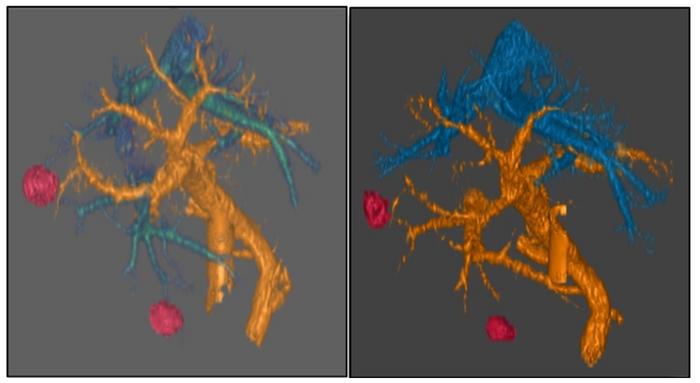Researchers at City of Hope, a prominent cancer research and treatment institution in the United States, are on the verge of a breakthrough in the treatment of pancreatic cancer, one of the deadliest forms of the disease. The team, led by Dr. Mustafa Raoof, has published a study in the journal Gastroenterology that identifies a new molecular target for therapeutic intervention. This research represents a crucial step toward transforming the treatment landscape for pancreatic ductal adenocarcinoma (PDAC), a type of cancer notorious for its aggressiveness and high mortality rate. With only a small percentage of patients surviving beyond five years post-diagnosis, the urgency for innovative treatment strategies has never been greater.
Pancreatic cancer often eludes conventional therapies due to its unique biology and the mechanisms it employs to resist these interventions. Dr. Raoof’s team has spotlighted transcription-replication conflicts (TRCs) as a significant vulnerability in pancreatic cancer cells. TRCs arise when the processes of gene transcription and DNA replication occur simultaneously, causing cellular stress and errors in genetic copying. This phenomenon is prevalent in PDAC, where the cancer thrives under conditions that are traditionally detrimental to normal cells. By harnessing this weakness, scientists hope to develop targeted therapies that can selectively eradicate cancer cells while sparing healthy tissue.
In previous studies, the researchers established that high levels of TRCs are a hallmark of pancreatic cancers, particularly those driven by the commonly mutated KRAS gene. Building upon this foundational work, Dr. Raoof’s team utilized an experimental drug known as AOH1996, developed at City of Hope, to assess its efficacy in targeting TRCs. This approach not only slowed tumor growth in preclinical models but also demonstrated the ability to induce cancer cell death without adversely affecting surrounding healthy cells. In a mouse model of pancreatic cancer, the drug significantly extended survival, offering researchers a promising avenue for further investigation.
Upon advancing to human trials, the research group focused on patients with advanced pancreatic tumors that had previously shown resistance to standard treatments. The results were compelling, with participants receiving AOH1996 reporting substantial reductions in tumor size. The most notable case revealed a 49% shrinkage in liver metastases after just two months of treatment, indicating that targeting TRCs could lead to meaningful clinical outcomes. This success underscores the potential of AOH1996 as a transformative therapy for patients grappling with one of the most challenging cancers.
Dr. Raoof emphasized the importance of this research, stating that exploring transcription-replication conflicts represents a groundbreaking approach to treating pancreatic cancer. He indicated that while traditional targets have often failed due to acquired resistance, TRCs offer a fresh perspective by identifying a universal vulnerability that cancer cells exploit. This is particularly crucial as new therapeutic agents targeting KRAS mutations enter clinical testing; understanding the mechanisms of TRC exploitation may prepare clinicians for potential resistance in these patients.
Nonetheless, the preliminary findings should be interpreted with caution. The initial trials were conducted on a small scale, and Dr. Raoof acknowledged the necessity for larger studies to validate these results and further explore the therapeutic potential of targeting TRCs in a broader patient population. Each step forward will contribute to a more nuanced understanding of how this innovative approach can be refined and optimized.
City of Hope’s legacy in cancer research and development is pivotal, having contributed to major advancements, including the creation of synthetic human insulin and targeted cancer therapies. The institution’s ongoing focus on pancreatic cancer is bolstered by a recent $150 million donation aimed at accelerating research into effective treatments. This philanthropic gesture exemplifies the increasing urgency to combat pancreatic cancer, a disease that remains particularly resistant to existing therapies.
In the context of the increasing prevalence of pancreatic cancer and its dire prognosis, the findings shared by Dr. Raoof and his colleagues are not only significant but potentially life-saving. With the scientific community rallying around this promising avenue, the hope for new treatments that can effectively combat this formidable cancer continues to grow. The excitement surrounding AOH1996 and its potential role in changing patient outcomes reflects the relentless pursuit of innovation within cancer research, a field where breakthroughs are not just anticipated but urgently needed.
Continued research and collaboration among institutions will be essential as the journey toward a viable therapeutic solution for pancreatic cancer unfolds. As scientists delve deeper into the complex interactions of genetic processes and exploit cancer vulnerabilities, particularly those revealed through TRCs, the landscape of treatment options may soon expand, offering renewed hope for patients and families affected by this harsh disease.
The City of Hope study titled "Therapeutic Targeting of Oncogene-induced Transcription-Replication Conflicts in Pancreatic Ductal Adenocarcinoma," presents an exciting paradigm shift in our approach to battling pancreatic cancer. The findings from this research not only highlight the intricacies of cancer biology but also illuminate the pathways through which novel therapeutic strategies can be developed and deployed. Through disciplined research, a brighter future for pancreatic cancer treatment appears more attainable than ever before.
Dr. Raoof and his team remain committed to furthering this research, aiming to enhance the precision of therapies that capitalize on cancer’s weaknesses. As new methodologies and technologies emerge, the potential for breakthroughs in pancreatic cancer treatment continues to evolve, signifying a hopeful chapter in the ongoing battle against cancer.
Subject of Research: Therapeutic Targeting of Oncogene-induced Transcription-Replication Conflicts in Pancreatic Ductal Adenocarcinoma
Article Title: Therapeutic Targeting of Oncogene-induced Transcription-Replication Conflicts in Pancreatic Ductal Adenocarcinoma
News Publication Date: 8-Apr-2025
Web References: N/A
References: N/A
Image Credits: Dr. Mustafa Raoof / City of Hope
Keywords: Pancreatic cancer, Transcription-replication conflicts, AOH1996, Cancer research, Clinical trials.




